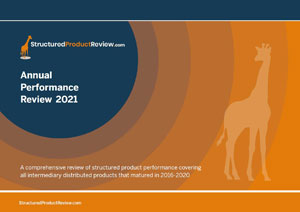15/11/2023
A criticism of structured products almost always at the forefront of the discussion is the exposure to potential counterparty failure. Structured products essentially function as a contract between the investor and the counterparty bank, facilitated by the product provider. In exchange for effectively lending the bank their capital for the term of the investment, the bank offers pre-defined terms for certain market outcomes detailed in the contract / product. Whilst potential for failure of a major bank or issuing institution is remote, history has proven that systemic events are possible and can shake the financial system. The collapse of Lehman Brothers demonstrated this back in 2008 and whilst catastrophic at the time, once the dust eventually settled the pain realised wasn’t as bad as many initially thought.
Should the counterparty bank default on its obligations, investors could theoretically be facing a total loss on their investment, however this is by no means a foregone conclusion. With Lehman’s investors were left to the mercy of the liquidator who had the task of selling the bank’s assets to repay debts. On the day of Lehman’s collapse the implied recovery rate for Lehman’s senior bonds was 30% but as it was for UK retail FTSE linked autocall investors the ultimate recovery rate was between 76.53% and 97.48% albeit over an eleven-year period. As such, no investor should have suffered a total loss but that should not belittle the risk where no matter how strong the institution may appear, the risk of collapse is always a possibility. Less than 1% of all structured products in the UK retail market at that time of the collapse were backed by Lehman Brothers. The other 99% that represented the wider market was unaffected.
More recently Credit Suisse, a counterparty to a small number of UK retail structures got into difficulty and was acquired by rival UBS, coordinated by the Swiss government and Swiss regulators. Whilst the outcome for $17 billion of Credit Suisse additional tier 1 bonds would be written down to zero, the senior secured credit backed structured products were unaffected and they continued to perform as defined in their product literature.
A key principle of sensible investing is of course diversification to the extent that no investor should have been substantially exposed solely to the risk of a single bank failure. Today’s UK retail structured products sector utilises ten globally systemically important banks providing ample opportunity to diversify counterparty risk. Details of each institution are included in the product literature, together with the ratings of perceived strength from credit rating agencies such as Standard & Poor’s, Moody’s and Fitch who typically rate these banks to have a strong capacity to meet their financial obligations.
Additionally, where the product is a structured deposit investors can potentially benefit from the protection provided by the FSCS which will pay up to £85,000 per person, per failed deposit-taker.
All investing involves risk in one form or another and with structured products, counterparty risk is almost always ‘baked in’. The ultimate acceptance is that risk plays a part in facilitating the defined returns of structured products, which with very few exceptions have delivered positive results.
Structured investments put capital at risk.
Also in this section
- Return of Nikkei
- Q1 2024 issuance
- Q1 2024 maturity results
- Structured Products – AAAAAGH!
- Hop in CIBC
- Re-enter Santander
- How to build a financial fortune - revisited
- Issuance in 2023
- Where's the risk?
- Questionable offerings
- Challenging the case against structured products - 'Loss of dividends'
- Navigating the investment landscape
- Challenging the case against structured products - Counterparty risk
- 6-year autocalls approaching final destination
- 1,750 FTSE capital at risk autocall maturities
- The leopard that changed her spots
- Q3 2023
- Challenging the case against structured products - Keydata
- Dilemmas for UK IFA's and the unique role of Structured Products
- 'High charges'
- Precipice bonds
- Intro
- FTSE 100 Contingent Income
- Indexing the indices
- Something different
- Investing through volatility
- 100 10:10s
- The best or worst?
- The 10%/25% 'Rule' that never was
- Structured products and the yield curve
- Fixed income: Capital at risk?
- Prospects for UK inflation - and fun with A.I!
- The Barrier Debate
- More Deposits for now
- Last of the Americans
- What if?
- Time heals all wounds, we hope...
- How to diversify portfolios using structured products?
- The Proof Is In The Pudding...
- Debunking Structured Misconceptions
- 1,500 FTSE Capital-at-Risk Autocall Maturities
- Q3 2022 Maturity Results
- What do we prefer?
- Deposits vs Capital ‘Protected’
- There’s time yet…
- Where did you invest your clients?
- A Six-Month Reflection
- Return of the Rev Con
- Happy 2nd Birthday FTSE CSDI
- Q2 2022 Maturity Results
- The best and worst yet still the best
- Critique my Suitability - Mariana 10:10 Plan June 2022 (Option 2)
- 10/10 for 55 10:10’s
- Q1 2022 Maturity Results
- 'How to build a financial fortune': a follow up
- Critique my Suitability - Mariana 10:10 Plan April 2022 (Option 2)
- 2021 Capital-at-Risk Autocall Maturity Review
- An unwelcome return...
- CSDI's First Birthday
- Bon Anniversaire
- Introducing the FTSE Custom 100 Synthetic 3.5% Fixed Dividend Index
- Q3 2021 Maturity Results
- Critique my Suitability - Mariana 10:10 Plan October 2021 (Option 2)
- Blurring the lines...
- Beware of false knowledge; it is more dangerous than ignorance
- Good news, bad news...
- Certainty is Certainly a Benefit
- Critique my Suitability - Mariana 10:10 Plan September 2021 (Option 2)
- A Twenty-Year Progression
- Q2 2021 Maturity Results
- Nine 8:8s Post Positive Returns in Falling Markets
- Critique my Suitability
- Q1 2021 Maturity Results
- Morgan Stanley’s Marvelous Maturity Medley
Current Products
We review the UK's retail structured investment sector, providing pertinent support for Professional Advisers and relevant research tools.
View all ⟶


